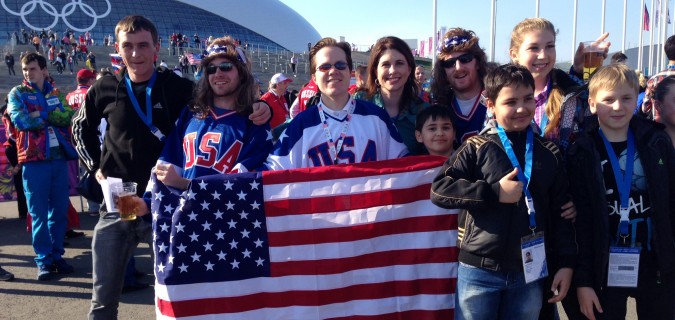When you think of the Olympics, a number of images come to mind — gold medals, athletes at the top of their game, and patriotism. This Olympics in Sochi was no different, but regrettably those images got overshadowed by others — terrorism, issues with hotels, and stray dogs.
However, my experience in Sochi was more about the former and not the latter. While I admit to experiencing a few #sochifail moments (especially the heightened security, which makes TSA look lax), they were minor relative to other experiences I have had with gigantic events and paled in comparison to the real story.
Nothing prepared me for experiencing the Olympics in real-time in Russia — not NBC coverage, not other sporting events, not even international travel. It was quite simply the most “epic” experience I have ever had.
As I reflected day-by-day on the odyssey, three lessons stood out:
Lesson #1: True Sportsmanship Has No Boundaries
I was lucky enough to get tickets to the now-legendary hockey game between the U.S. and Russia. You’d expect major rivalry between the fans of the two countries. Instead, the game was a testament to true sportsmanship. Before and after the game, Russians were excited to take pictures with us and vice versa. (See the photo above.) For many, it was the first time they had ever met an American. While it was intense on the ice, the crowd during the game was jubilant, but never offensive.
This was an incredible lesson in leadership, both on and off the ice. Why can’t we compete on the ice, but be civil off the ice? Whether in corporate offices or Congress, we all need to learn this Olympic lesson.
Lesson #2: Competition Pushes Us Forward
Spoice was the word trending after Sage Kotsenburg’s gold medal win on the snowboarding slopestyle. Spoice, according to Urban Dictionary, is “an exclamation of gratitude towards life. It’s the proper word to use when you find yourself in a situation involving a multitude of positive things at once. You may only utter it with pure joy behind it.”
Kotsenburg won his medal by trying something he had never done before — the 1620 Japan Air Mute Grab. Why did he attempt this? He told NBC that it was because he wanted to set himself apart from his competition.
Competition does that – it makes us try new things and push ourselves, and your competition, forward. This is a great lesson for all of us: try new things, push boundaries, and always “keep it spoice!”
Lesson #3: Always Get Up After a Fall
Figure skating is one of the favorite events of the Winter Olympics. and the sport had its ups and downs. One of the toughest moments was Jeremy Abbott’s fall during the men’s singles short program. However, one of the most inspiring moments — and one shared with many Olympians — is when he got back up and finished his program to the roar of the crowd. We can learn a lot from Olympians like Abbott about taking chances — and, when they don’t result in success, getting back up to try again.
While the Olympics are over, the lessons should stay with us. As Russian playwright, Anton Chekhov, said: “Knowledge is of no value unless you put it into practice.” What I learned from Olympians is that, while they may have extraordinary athletic ability, what makes them special is that they are all about action and practice – they take discipline to a whole new level.
About the photo: The author (center), along with a group of both Russian and American tourists, poses with the U.S. flag in Sochi.













